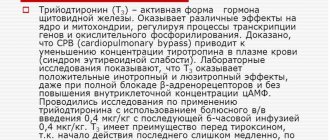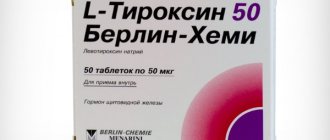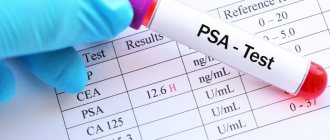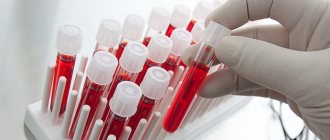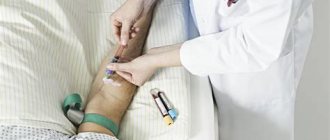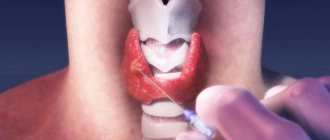What is the free T3 hormone responsible for?
T3 is an active iodine-containing hormone that is produced by the follicular cells of the thyroid gland. It contains three iodine atoms, so more than 80% of triiodothyronine is formed due to deiodination (removal of one iodine atom) of tetraiodothyronine (T4). Most of the hormone is bound to proteins in the blood serum. No more than 0.3% of T3 circulates freely in the bloodstream, without forming compounds with blood components.
Free triiodothyronine regulates the metabolic activity of the body. The main functions of free triiodothyronine (FT3):
- increased heat production;
- acceleration of retinol synthesis in the liver;
- oxygen consumption by soft tissues;
- acceleration of protein metabolism;
- excretion of calcium from the body by the kidneys;
- acceleration of cholesterol catabolism;
- increased serum glucose concentration;
- increased activity of growth hormone and insulin;
- stimulation of bone marrow cell turnover;
- absorption of B12 from the small intestine;
- biosynthesis of sex hormones;
- strengthening the motor function of the gastrointestinal tract;
- development of the central nervous system in children;
- stimulation of bone tissue growth;
- reduction of lipids and triglycerides in the blood.
Most patients with thyrotoxicosis have elevated levels of bound and free T3.
This is caused by iodine deficiency conditions, when the level of thyrotropin (TSH) is low against the background of hyperproduction of triiodothyronine. The concentration of unbound T3 in the blood serum is determined by the rate of conversion of bound hormone to free (T3/FT3). An increased content of triiodothyronine is fraught with increased contractile activity of the myocardium and intestinal motility. Due to the stimulation of the hematopoietic function of the bone marrow, the concentration of red blood cells in the blood increases.
An analysis for T3 content is performed to assess the correct functioning of the thyroid gland. If symptoms of hyperthyroidism are detected, in half of the cases this is due to an increased concentration of triiodothyronine in the blood. Laboratory tests are carried out to monitor the effectiveness of treatment of endocrine pathologies.
Reasons for increased triiodothyronine in the blood
The primary production of triiodothyronine occurs in the prenatal period, that is, in the womb. In the absence of the hormone, the physical and mental development of the child is impossible. T3 synthesis is influenced by other hormone-regulating organs - the hypothalamus and pituitary gland.
The anterior lobes of the pituitary gland produce thyrotropin (TSH), which stimulates the activity of the thyroid gland. It regulates the synthesis of tri- and tetraiodothyronine. In the absence of abnormalities in the functioning of the endocrine system, the level of free T3 does not exceed 6.8 pmol/l.
Having received the test results, many patients do not know what it means if their T3 level is higher than normal. An increased concentration of thyroid-stimulating hormones indicates thyroid disease:
An increased level of triiodothyronine is indicated by excessive irritability, aggressiveness and fatigue. Over time, tremors of the upper extremities and heart pain occur.
In 15% of cases, elevated T3 results from taking hormonal and corticosteroid drugs. An overactive thyroid gland is caused by:
- estrogens;
- valproic acid;
- oral contraceptives;
- amiodarone;
- tamoxifen;
- methadone;
- clofibrate;
- terbutaline;
- heroin, etc.
Elevated triiodothyronine in a child is often caused by genetic pathologies and autoimmune disorders. Excessive synthesis of the hormone occurs as a result of the production of antibodies to thyroid receptors, which are sensitive to thyrotropin. The consequence is a diffuse proliferation of glandular tissue, an increase in the content of thyroid hormones - T3 and T4.
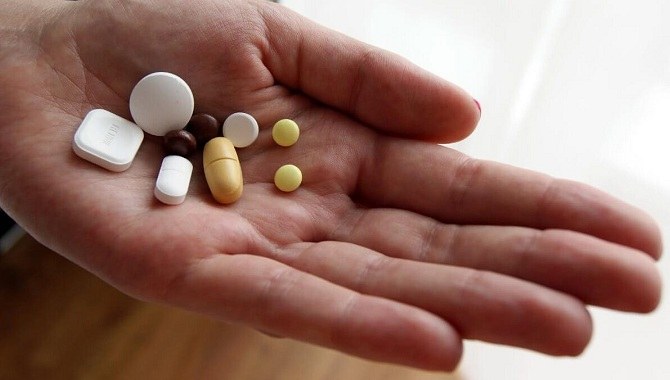
Abuse of drugs to increase potency leads to disruptions in the functioning of the thyroid gland. According to statistics, 27% of patients who were found to have elevated T3 levels systematically took drugs to restore erectile function.
Many women after 45 years old experience hormonal imbalances. This is often associated with the onset of menopause. The decline of ovarian function leads to changes in the functioning of the endocrine system. Elevated triiodothyronine provokes excessive sweating and sudden mood swings.
Diagnostic value of T3 indicator
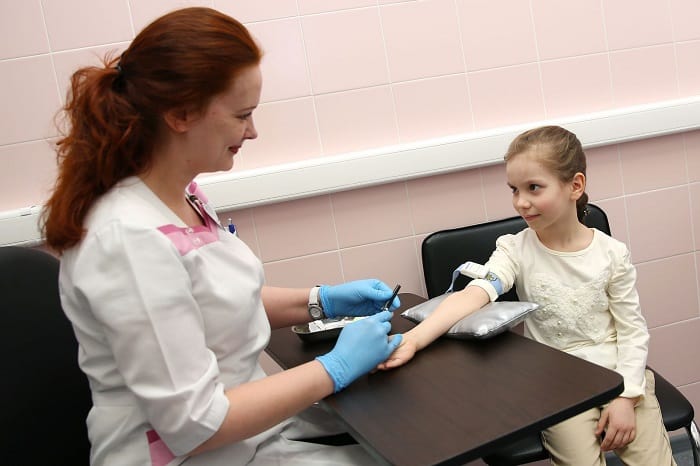
If there is a direction for analysis, it should not be postponed
If there is a suspicion of problems with the endocrine system, the child is sent for tests:
- TSH and T4 levels indicate whether the thyroid gland is functioning sufficiently.
- T3 is able to show what kind of disease has affected a person.
The T3 level can confirm one disease or exclude the possibility of another. However, all laboratory tests will always be taken into account when making a diagnosis.
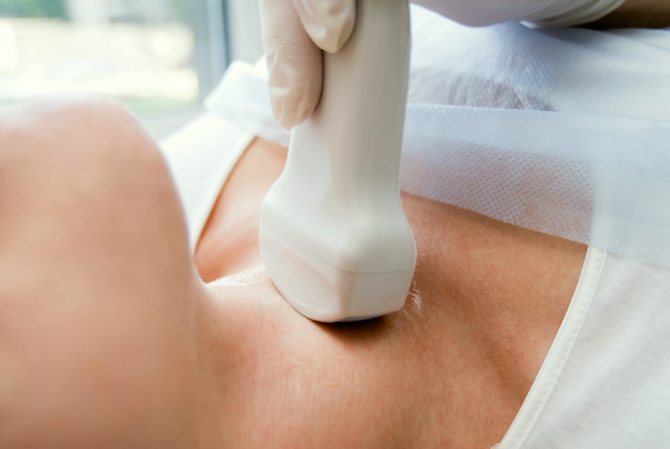
Additional research is required
Important: for a clear diagnosis, blood tests are always not enough; additional research methods are required, sometimes even a puncture of the thyroid gland.
Table No. 1. Diseases and situations accompanied by a deviation from the norm of the T3 indicator:
| The indicator has increased | The indicator has been reduced |
| T3 toxicosis | Hypothyroidism |
| Primary thyrotoxicosis or disease relapse condition | Autoimmune inflammatory conditions of the thyroid gland |
| Thyrotoxicosis after hormonal therapy | Taking androgens |
| Taking estrogen-containing medications and contraceptives | Taking propranolol |
| Some types of drugs | Taking coumarin and its derivatives |
However, there are cases of thyrotoxicosis with preservation of normal T3 levels. This situation occurs in 10% of cases.
Important: the worst reason for which there are changes in hormone production is the occurrence of tumors of the thyroid gland and pituitary gland.
What symptoms indicate high T3?
An increase in T3 in the body inevitably leads to changes in the functioning of internal organs. The following symptoms indicate endocrine disorders:
- muscle weakness;
- fast fatiguability;
- increased appetite;
- hair thinning;
- tachycardia or bradycardia;
- temperature increase;
- hand trembling;
- loose stools;
- protrusion of eyeballs;
- sleep disturbance;
- a sharp decrease in body weight;
- high blood pressure;
- emotional lability;
- menstrual irregularities;
- feeling of heartbeat in the stomach.
With elevated T3 in older people, myocardial dystrophy occurs - a dysfunction of the myocardium caused by its depletion. The disease is fraught with cardiosclerosis and ascites.
Catabolic syndrome is one of the first signs of an increase in triiodothyronine levels. It is characterized by sudden weight loss, excessive sweating and increased appetite. People with thyrotoxicosis do not feel cold even when the ambient temperature is very low.
With an increased content of thyroid hormones, eye disorders occur - lifting of the upper eyelid, bulging eyes, chronic conjunctivitis against the background of incomplete closure of the eyelids. The patient's face takes on an expression of anger or fear. Symptoms indicate diffuse toxic goiter.
With a moderate increase in T3 concentration, the ability to conceive rarely decreases. But progression of the disease during pregnancy is fraught with neonatal thyrotoxicosis in newborns. It presents with fetal tachycardia in the last trimester of gestation, hypertension, and poor weight gain after birth.
Symptoms and treatment of low free T3
Having understood what it means if free T3 is below normal, you need to understand how to determine this deviation. There are a number of signs that indicate it, but most of them are only indirect symptoms. But it is still worth paying attention to its occurrence.
So, if the T3 hormone is reduced, a person may suffer from:
- constant weakness;
- fatigue;
- cramps in the limbs;
- swelling of the face, hands, ankles;
- digestive disorders;
- nausea;
- vomiting;
- dizziness;
- headaches;
- frequent constipation;
- diarrhea;
- decrease in body temperature;
- absent-mindedness;
- inattention;
- sleep disorders;
- pale skin;
- feeling of coldness in the extremities;
- decreased libido (in women);
- problems with potency (in men).
Of course, if free T3 is really below normal, then only a clinical test of the patient’s blood can confirm this. In addition, most of these symptoms are characteristic of other diseases, so it is not worth speculating about a possible diagnosis if one or 2 of them are present. However, if most of the signs from the above list occur, the patient should be wary and immediately contact a therapist, who can refer him for a consultation with an endocrinologist.
Important! The case where free T3 hormone is low in a small child deserves special attention. In such a situation, you cannot hesitate - you must urgently seek medical help. If you ignore the existing problem and put off going to the doctor, this can seriously affect the health of the sick child. Including his physical and mental development.
Is there a cure for free T3 deficiency?
What to do if T3 hormone is low? Is it possible to correct the situation without medical intervention? As a rule, it is not possible to normalize the hormone level on your own, since its decrease is directly related to pathological processes. For this reason, it is better to leave this issue to an endocrinologist.
So, treatment if free T3 is low requires:
- taking hormonal medications aimed at restoring the hormone-producing function of the thyroid gland;
- symptomatic therapy (painkillers, antiemetics, sedatives, etc.).
In particularly severe cases, the patient may undergo radical medical intervention. For example, when a goiter forms, conservative therapy is effective only in the first stages of its development. If this moment has been missed, surgical removal of the enlarged gland is performed, since as it grows it begins to increasingly threaten the patient with suffocation.
Treatment of triiodothyronine deficiency, if caused by diseases, is a lengthy process. For his part, the patient must do everything in his power to speed it up: review his diet, change his lifestyle, give up bad habits and under no circumstances take any medications without the prescription of an endocrinologist. These are the simplest recommendations, following which, treatment of the underlying pathology that caused T3 deficiency will be much faster.
How and when to take a free T3 test correctly
Deiodination of thyroxine to form T3 occurs more rapidly in the pituitary gland than in peripheral tissues. Therefore, determining the concentration of free triiodothyronine is of particular importance in assessing the state of the endocrine system. If there are signs of increased levels of thyroid hormones, it is necessary to take a blood test for T3.
Indications for hormonal testing are:

The endocrinologist prescribes a T3 test only after receiving the results of the test for thyrotropin concentration. If they do not correspond to normal values, a repeat analysis is done to determine the level of TSH and T3.
Proper preparation for the procedure prevents false positive and false negative results. To determine objective hormonal status it is necessary:
- 2-3 days before the study, stop taking hormonal medications;
- do not consume food or carbonated drinks 4 hours before the test;
- Stop smoking the night before the test.
The diagnostic results are influenced by the general condition of the patient. It is not advisable to undergo hormonal testing during an exacerbation of a viral or bacterial infection. Elevated T3 during pregnancy is not always a consequence of endocrine disorders. A false positive result in the 3rd trimester is associated with the production of thyroid hormones by the thyroid gland not only of the woman, but also of the fetus.
T3 hormone test
Analysis of hormones T3, T4, TSH is the main analysis in the work of an endocrinologist who treats thyroid diseases. For economic reasons, the T3 hormone is often not tested at all - this reduces the overall cost of blood testing for hormones, but in some cases it can lead to diagnostic errors.
It should be borne in mind that with nodular toxic goiter (Plummer's disease = toxic adenoma of the thyroid gland, also with multinodular toxic goiter), often autonomously functioning nodes produce the T3 hormone. There are also cases of more active production of the T3 hormone in diffuse toxic goiter (Graves' disease, Graves' disease). For such situations, when the T3 hormone is predominantly elevated, a special term has even been coined - T3 toxicosis. It occurs with more severe symptoms than with an increase primarily in the T4 hormone, and is more slowly eliminated with drug therapy.
Why is an increase in triiodothyronine dangerous?
Elevated free T3 threatens serious complications. Hormonal imbalance leads to changes in the functioning of several systems at once:
- nervous;
- cardiovascular;
- urinary;
- reproductive;
- digestive;
- immune;
- hepatobiliary.
The most negative consequences of an excess of thyroid hormones in the blood include:
- thyrotoxic hepatosis – dystrophic changes in the liver caused by impaired lipid metabolism;
- hypokalemic transient paralysis - a violation of muscle contractile activity caused by a decrease in potassium concentration;
- heart failure - weakening of myocardial functions, accompanied by congestion;
- atrial fibrillation is a heart rhythm disorder caused by chaotic contraction of the atria.

It is manifested by shortness of breath, hypertension, diarrhea, tachycardia, abdominal pain, mental overexcitation. For 35-50% of patients, thyrotoxic crisis is fatal. Hyperthyroidism in pregnant women negatively affects the development of the fetus. Antibodies to thyrotropin receptors are transferred to the child transplacentally. Because of this, newborns are diagnosed with transient hyperthyroidism.
How to normalize thyroid function
Elevated T3 is the basis for prescribing hormonal therapy. To reduce the concentration of triiodothyronine, take antithyroid drugs:
- Propycyl;
- Tyrosol;
- Mercazolil, etc.
Medicines accumulate in the thyroid gland, suppressing the synthesis of iodine-containing hormones. After the signs of the disease disappear, the dose of drugs is gradually reduced. If, after stopping treatment, the T3 level rises again, surgical intervention is resorted to.
For diffuse goiter, radioactive iodine therapy is prescribed. It penetrates the thyroid lobes, where it begins to gradually disintegrate. Local irradiation of the thyroid gland leads to the death of some of its cells. This reduces its size and T3 production.
Radioactive iodine therapy is contraindicated in pregnant women, which is associated with possible dysfunction of the thyroid gland in the fetus.
In 63% of cases, elevated T3 is a consequence of glandular growth. Therefore, if drug treatment is ineffective, a thyroidectomy is performed - removal of the thyroid gland. After surgery, patients exhibit symptoms of hypothyroidism. To compensate for the lack of thyroid hormones, they are prescribed hormone replacement therapy.
T3 below normal
In case of thyroid disease, tests are performed that help identify any abnormalities in hormonal levels. TSH, T3 and T4 are taken into account. This helps to identify the disease in advance when it reaches a high degree of development, and also to select medications that will help normalize the levels of hormones in the blood. In many diseases, TSH and T3 are reduced or decreased TSH is observed with normal T4 and T3. First of all, specialists will be able to immediately weed out those diseases that appear with an increase in the level of these substances. A decrease leads to a deterioration in a person’s well-being and external condition. After the tests, treatment measures must be taken. In practice, a variety of surges occur, including cases when TSH is low and T3 and T4 are elevated.
TSH and T3 are low: reasons
When tests confirm a reduced level of this hormone, the reason should be found out, which led to a decrease in its level. In most cases, this is a violation of the production of thyroid hormones. It stops working at full capacity due to injury, inflammation or internal blockers. This violation may occur in the following cases:
- A course of radioactive iodine therapy was carried out when treating toxic diffuse goiter. Then measures are taken to reduce the level of T3, since with this disease it becomes higher than the accepted norm.
- A similar situation can also arise after surgery on the thyroid gland, when part or all of it was removed.
- T3 can also become lower than normal with other methods of treating diffuse goiter. Its content can be affected by thyreostatics, such as propicyl, tyrosol, mercazolil. This disease is most often treated with medication and the wrong dose can lead to a drop in the level of T3 and other thyroid hormones.
- For a disease such as Hashimoto's thyroiditis, or autoimmune thyroiditis. In this case, the immune process begins to destroy some of the thyroid cells. As a result, its performance decreases, since the attacked cells stop producing hormones, without the possibility of restoring this function.
- Taking medications that contain large amounts of iodine, such as amiodarone, cordarone and others.
Most often, experts associate a decrease in the hormone with various diseases of the thyroid gland. In addition, disorders of the pituitary gland, hypopiutarism and empty sella syndrome can also affect this.
Prevention of thyroid diseases
Hormonal imbalance in most cases is associated with the negative influence of external factors and pathologies of the endocrine system.
Elevated T3 levels in 30% of patients are the result of iodine deficiency conditions. To prevent thyroid diseases, you should:
- to refuse from bad habits;
- limit the use of hormonal contraceptives;
- consume potassium and iodine containing products;
- avoid stressful situations;
- reduce physical activity;
- take vitamin and mineral complexes;
- treat diseases of the reproductive system in a timely manner.
There is no specific prevention of elevated triiodothyronine. But maintaining a healthy lifestyle and a balanced diet prevent iodine deficiency and thyroid dysfunction.
Who is the change shown to?
The doctor prescribes patients to determine the T3 level if they suspect endocrinopathies that are associated either with the thyroid gland or with the hypothalamic-pituitary system.
Indications for determining the level of triiodothyronine in the blood include:
- suspicion of primary thyroid disease;
- monitoring of hormonal therapy for already diagnosed thyroid pathology;
- the need for differential diagnosis of endocrine diseases.
It is not advisable to prescribe this test yourself and take this test without a doctor’s referral. The analysis is deciphered only by a qualified medical professional in conjunction with clinical data and the results of other studies.
